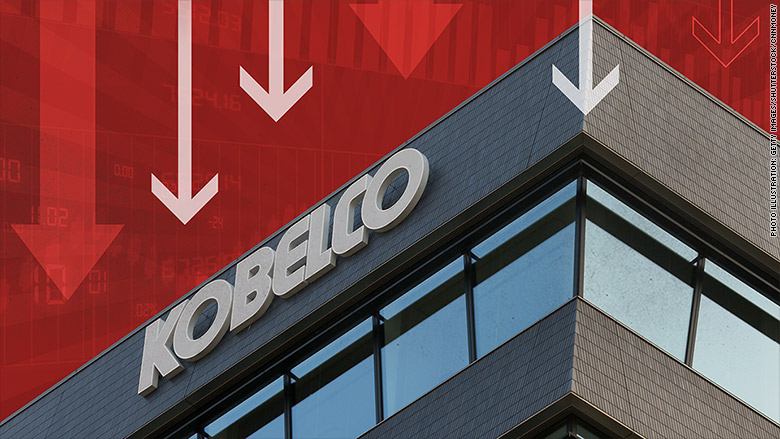Hendrik_2000
Lieutenant General
Now this is interesting, the Japanese always touted their HSR as the safest and of the highest quality. And now this
Substandard metal parts used in Japan's bullet trains
by Sherisse Pham October 12, 2017: 7:36 AM ET
) were used in the manufacturing of several bullet trains.
The scandal came to light Sunday, when Kobe Steel said employees had falsified data about the strength and durability of thousands of tons of aluminum and copper parts sold between September 2016 and August 2017. They did not meet specifications agreed with customers.
Central Japan Railway (), which operates high speed trains between Tokyo and Osaka, found aluminum parts used in the truck -- the part that connects the wheels to train cars -- failed to meet company standards, said spokesman Atsuo Utano. A total of 310 tested parts were found tobe substandard.
West Japan Railway () also foundsubstandardKobealuminum parts in seven high speed trains made by Hitachi and Nippon Sharyo, according to West Japan Railway spokesman Shugo Nishimura. West Japan operates bullet trains between Osaka and Hakata.
Both companies said the components do not pose any safety risks, and that they are considering replacing them during routine maintenance.

Kobe Steel's admission this week sent shock waves through the global automotive and aerospace supply chains. Toyota (), Honda (), Nissan () and Mazda () have all confirmed to CNNMoney that they bought substandard parts from Kobe Steel, as did plane maker Mitsubishi Heavy ().
Subaru () has also confirmed that it bought affected products. Subaru and Mitsubishi are major suppliers to Boeing ().
A Boeing spokesman has said the company was inspecting its supply chain for any substandard components. Ford () and GM () said Thursday they are investigating any potential impact.
The fallout will likely continue. Kobe Steel President and CEO Hiroya Kawasaki told reporters on Thursday that there may be other cases in which data has been fabricated.
The Japanese government is demanding answers.
A government spokesman told CNNMoney that the Ministry of Economy, Trade and Industry has ordered Kobe Steel "to report the result of safety checks within around two weeks, and conduct a thorough investigation of the reason for data fabrication and prevention measures within a month."
-- Chie Kobayashi and Daniel Shane contributed to this report.
CNNMoney (Hong Kong)
Substandard metal parts used in Japan's bullet trains
by Sherisse Pham October 12, 2017: 7:36 AM ET
) were used in the manufacturing of several bullet trains.
The scandal came to light Sunday, when Kobe Steel said employees had falsified data about the strength and durability of thousands of tons of aluminum and copper parts sold between September 2016 and August 2017. They did not meet specifications agreed with customers.
Central Japan Railway (), which operates high speed trains between Tokyo and Osaka, found aluminum parts used in the truck -- the part that connects the wheels to train cars -- failed to meet company standards, said spokesman Atsuo Utano. A total of 310 tested parts were found tobe substandard.
West Japan Railway () also foundsubstandardKobealuminum parts in seven high speed trains made by Hitachi and Nippon Sharyo, according to West Japan Railway spokesman Shugo Nishimura. West Japan operates bullet trains between Osaka and Hakata.
Both companies said the components do not pose any safety risks, and that they are considering replacing them during routine maintenance.

Kobe Steel's admission this week sent shock waves through the global automotive and aerospace supply chains. Toyota (), Honda (), Nissan () and Mazda () have all confirmed to CNNMoney that they bought substandard parts from Kobe Steel, as did plane maker Mitsubishi Heavy ().
Subaru () has also confirmed that it bought affected products. Subaru and Mitsubishi are major suppliers to Boeing ().
A Boeing spokesman has said the company was inspecting its supply chain for any substandard components. Ford () and GM () said Thursday they are investigating any potential impact.
The fallout will likely continue. Kobe Steel President and CEO Hiroya Kawasaki told reporters on Thursday that there may be other cases in which data has been fabricated.
The Japanese government is demanding answers.
A government spokesman told CNNMoney that the Ministry of Economy, Trade and Industry has ordered Kobe Steel "to report the result of safety checks within around two weeks, and conduct a thorough investigation of the reason for data fabrication and prevention measures within a month."
-- Chie Kobayashi and Daniel Shane contributed to this report.
CNNMoney (Hong Kong)

